2016
9th ASEAN-Australia-New Zealand Track II Dialogue, Kuala Lumpur
31 October–1 November 2016
CSS Regional Security Fellow, Paul Sinclair, travelled to Kuala Lumpur as a member of the Asia New Zealand Foundation’s delegation that took part in the 9th ASEAN-Australia- New Zealand track two dialogue held on 31 October and 1 November 2016. Paul presented papers in the panel discussions on the topics ASEAN at 50 (PDF 362KB) and National Security, Political Stability and Civil Liberties: Achieving equilibrium and balance (PDF 371KB).
Track II Dialogue with Prospect Foundation, Taiwan
27 October 2016
Paul Sinclair, CSS Regional Security fellow, was a member of the Asia New Zealand Foundation’s track two delegation that took part in a dialogue with Taiwan’s Prospect Foundation on 27 October 2016. Paul presented a paper on the South China Sea (PDF 353KB). Paul also took part in a series of calls on Taiwan’s officials the following day on a range of issues including Taiwan’s revised Southbound policy which seeks to strengthen relations with the ASEAN countries and Australia and New Zealand.
CSS at Track 1.5 Dialogue, Strategic Policy Institute, Canberra
24 October 2016
On 24 October Paul Sinclair, CSS Regional Security Fellow, took part in a track 1.5 meeting that included defence officials and academics from Australia and New Zealand that was hosted by Australia’s Strategic Policy Institute in Canberra. Paul presented a paper on Islamic state in South-east Asia (PDF 353KB).
Roundtable on emerging security challenges in the Asia-Pacific
31 August 2016
On 31 August the Centre for Strategic Studies and Massey University’s Centre for Defence and Security Studies co-hosted a very well-attended roundtable on emerging security challenges in the Asia-Pacific. The roundtable featured three speakers: Professor Aileen Baviera, from the University of the Philippines; Dr Tang Lan, from the China Institute of Contemporary International Relations; and Professor Greg Barton from Deakin University in Melbourne. Among the subjects discussed during their presentations and subsequent question and answer session were the role of social networks in Islamic extremist recruitment and radicalisation; developments in China-Philippines relations in the wake of the Hague Tribunal’s verdict on China’s claims in the South China Sea and the election of President Duterte; the rapid growth of e-commerce in China and its implications;and China’s concerns about the advent of terrorism in Central Asia and its connections with terrorist incidents in China’s Xinjiang province.
Sir Howard Kippenberger lecture 2016
18 August 2016
Professor Bates Gill, the 2016 Kippenberger Chair in Strategic Studies, delivered a Public Lecture to a capacity audience in the Hunter Council Chamber at Victoria University of Wellington. Prof Gill’s presentation ‘China's Future under Xi Jinping’ explored both the style and substance of Xi Jingping’s leadership and his domestic reform agenda. Dr Gill tackled a number of questions and uncertainties both within China and amongst China’s neighbours. He looked at some of the biggest obstacles ahead for Xi Jingping to realise his promised ‘great rejuvenation of the Chinese nation’. Prof Gill’s paper on this topic will be published separately.
The Kippenberger Lecture 2106 is available to view on YouTube
CSS hosts Canada’s Chief of Defence Staff, General Jon Vance
11 August 2016
On 11 August the Centre for Strategic Studies hosted a roundtable with Canada’s Chief of Defence Staff, General Jon Vance. Gen Vance discussed the themes that would inform Canada’s forthcoming defence policy review. These included renewing Canada’s commitment to United Nations peace operations; maintaining strong commitments to NATO and NORAD, (the North American Aerospace Defence Command); strengthening the focus on the surveillance and control of Canadian territory; and its approaches with a particular emphasis on the Arctic; and ensuring a strong link between defence and foreign policy and national security. Gen Vance also outlined the public consultation process which has just concluded, the results of which will be factored into a new defence policy to be released in early 2017.
'Terrorism where Terror isn't' - Roundtable with CSS Police reseach fellow
26 July 2016
Dr John Battersby, Police Research Fellow at the Centre for Strategic Studies (CSS), gave a presentation on his current research on terrorism in New Zealand at CSS on 26 July. At a well-attended roundtable Dr Battersby addressed the assumption of an absence of terrorism in New Zealand. He discussed our legislative architecture as it relates to policing terrorism and its currency and effectiveness in the face of evolving terrorism events overseas. He also compared and contrasted Australia’s and New Zealand’s experiences of terrorism. Among the issues raised was the recent trend overseas for jihadist attacks to trigger tragic attacks by people with mental health issues which while not directly related to jihadist objectives, still caused mass casualties.
CSS Roundtable: Regional Assistance Mission to Solomon Islands
20 June 2016
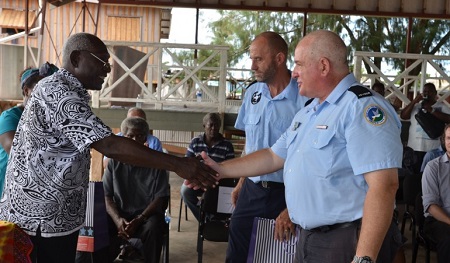
On 20 June the Centre for Strategic Studies held a roundtable with Quinton Devlin, Special Coordinator of the Regional Assistance Mission to Solomon Islands (RAMSI). In his address and subsequent discussion, Quinton outlined planning for RAMSI’s withdrawal in June 2017; the Mission’s priorities over the final 12 months of its presence; recent developments in Solomon Islands; RAMSI’s relationship with the Solomon Islands government; plans for re-arming elements of the Solomon Islands Police Force for certain operations, and post-RAMSI security arrangements.
Roundtable with Dhruva Jaishankar
9 June 2016
On 9 June the Centre for Strategic Studies held a roundtable with Dhruva Jaishankar, a Fellow for Foreign Policy at the Brookings Institution India Centre in New Delhi. His presentation addressed the question 'Will India be an Asian power?'. The presentation and subsequent discussion covered a range of subjects including India’s relations with China, Japan, ASEAN, the United States and Russia; India’s stance on free trade agreements; the South China Sea; security concerns in the Indian Ocean; India’s role in the South Pacific; the Shanghai Cooperation Organisation; India’s role in the South Asian Association for Regional Cooperation (SAARC); the motives for India’s growing relations with Middle Eastern countries including Israel, and the problems hindering efforts to build a more substantive relationship between New Zealand and India.
45th CSCAP Steering Committee meeting, Kuala Lumpur
1–2 June 2016
Following the Asia Pacific Roundtable in Kuala Lumpur, Associate Professor David Capie, Director of the Centre for Strategic Studies, and Paul Sinclair attended the 45th Steering Committee meeting of the Council for Security Cooperation in the Asia Pacific (CSCAP), which was also held in Kuala Lumpur 1-2 June 2016. The purpose of this bi-annual meeting is to review the work of current CSCAP study groups, to consider proposals to establish new study groups, and to discuss issues of direct relevance to the broader security interests of member countries. The Committee reviewed progress made by study groups on energy security; preventive diplomacy; non-proliferation and disarmament; the harmonisation of aeronautical and maritime search and rescue, and marine environmental protection, and agreed to establish a new study group on enhancing contributions from Asia Pacific countries to United Nations peacekeeping operations. The Committee also welcomed Myanmar’s application to join CSCAP, and had a useful discussion on strengthening the relationship between track two events (those conducted by CSCAP) and track one (ARF and related bodies). The committee is co-chaired by an ASEAN and non-ASEAN member. The current CSCAP ASEAN chair is held by Malaysia. At this meeting the United States completed its term in office and Japan will now take this position for the next two years.
30th Asia Pacific Roundtable, Kuala Lumpur
30 May–1 June 2016
Associate Professor Dr David Capie, Director of the Centre for Strategic Studies, and Paul Sinclair, regional security fellow at the Centre, attended the 30th Asia Pacific Roundtable held in Kuala Lumpur 30 May-1 June 2016. The roundtable is regarded as the premier Track Two event in the Asia Pacific. This year’s Roundtable was given the theme Cooperation and Contestation in a changing regional landscape and drew a large audience from the Asia Pacific region and beyond. The Roundtable was opened with an address by Malaysia’s Prime Minister, the Hon Dato Sri Mohd Najib Tun Abdul Razak. Subjects discussed over the following two days included regional security in the Asia Pacific: present state and future trajectories (with the first address given by Malaysia’s Defence Minister); the ASEAN Community: Integration in an age of contending interests; new strategies to battle ignorance, violence and extremism; energy prices with a focus on climate change and geopolitics; human insecurity- confronting displacement and trafficking; and security and stability in the South China Sea – possibilities and complexities. For the first time for many years the Roundtable also featured a series of concurrent sessions. David spoke at one of these sessions, the aim of which was to provide a strategic update on South-east Asia and Oceania. A copy of his paper can be found …. .Other speakers in this session provided an analysis of the likely policies to be implemented by President-elect Duterte in the Philippines and of the policy direction of the new government in Myanmar. Other concurrent sessions provided strategic updates on developments in other parts of the Asia Pacific and further afield.
CSS hosts Japanese delegation
16 May 2016
Mr Kazuya Endo, Director of Japan’s Ministry of Foreign Affairs’ United Nations Policy Division, called on the Centre for Strategic Studies on 16 May to discuss Japan’s approach to its role on the United Nations Security Council and possible opportunities for harmonising this approach with New Zealand objectives for the remainder of our presence on the Council. Issues discussed included the tightening of sanctions on North Korea, the growth in UN Special Missions, peacekeeping in Africa, the situation in Syria, and Security Council reform.
Public lecture by Prof Wang Jisi fills Hunter council chamber
12 April 2016
The Centre for Strategic Studies, with the Asia New Zealand Foundation, hosted a public lecture by Professor Wang Jisi, President of China’s Institute of International and Strategic Studies, and Professor at the School of international Studies at Peking University. Professor Wang’s address attracted a capacity audience at Victoria University’s Hunter Council Chamber. In his lecture and subsequent question and answer session, Prof Wang discussed China-United States relations; China’s relations with Japan, with the two Koreas, and with ASEAN; China’s objectives in the South Pacific; developments in the South China Sea; the need to strengthen the regional security architecture, and the Trans-Pacific Partnership Agreement.
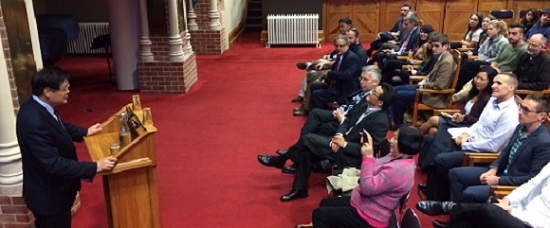
Prof Wang Jisi's lecture China-US Relations and International Order is available to view on YouTube.
United States congressional delegation visits CSS
5 April 2016
On 5 April the Centre for Strategic Studies (CSS) held a roundtable discussion with United States Congressman Matt Salmon, Chair of the House Sub-Committee on Asia and the Pacific, and Cynthia Lummis, the sole House Representative for the State of Wyoming. The Congressional delegation was welcomed to the University by the Pro Vice-Chancellor (International Engagement) Professor Rob Rabel. Following a short CSS presentation on New Zealand’s perspectives of the security situation in the Asia-Pacific, the Congressional Representatives discussed prospects for the passage of the Trans-Pacific Partnership Agreement through the United States legislature; China-United States relations; recent developments in the South China Sea; the Korean Peninsula; China-Taiwan relations; the situation in the Middle East; the role of ASEAN in the region’s security architecture; and the contest to select the Republican candidate to contest the United States Presidency.
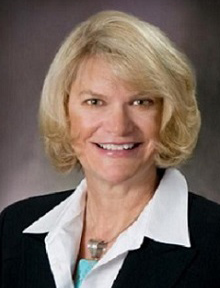
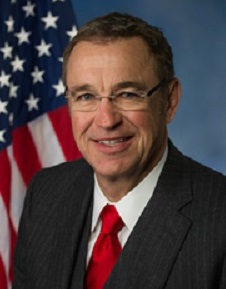
CSS hosts Canada’s Defence Minister
1 April 2016
The Centre for Strategic Studies hosted a roundtable, on 1 April, with Canada’s Defence Minister, the Hon Harjit Sajjan. Pro Vice-Chancellor (International Engagement), Professor Rob Rabel, welcomed the Minister who discussed a range of issues including Afghanistan (where as a Lieutenant Colonel in the Canadian army he had served three tours of duty in Kandahar); strengthening capacity building in conflict prevention; Islamic State; his Government’s intention to give greater emphasis to Canada’s role in the Asia-Pacific region; Canada’s Arctic policy; defence relations with New Zealand; and the importance of multilateralism in global and regional affairs.
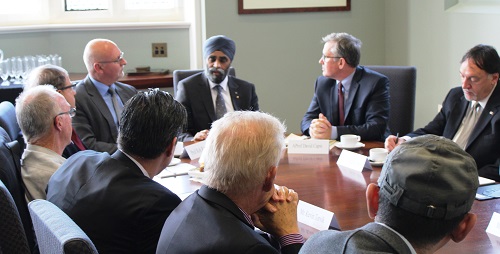
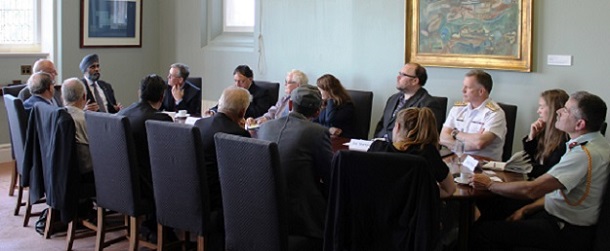
CSS hosts French military delegation
9 March 2016
Vice Admiral Charles-Henri de la Faverie du Ché, Director General of International Relations and Strategy in France’s Ministry of Defence, called on the Centre for Strategic Studies on 9 March for discussions on a range of security issues. Subjects discussed included the South China Sea, the Korean Peninsula, Chinese and Russian military activities in the South Pacific, Syria, Iraq and Daesh and the problems of finding a solution to the complex problems presented by the situation in Syria, and European defence issues.
CSS Roundtable with academics from the Diplomatic Academy of Vietnam
8 March 2016
On 8 March, the Centre for Strategic Studies held a roundtable with visiting academics from the Diplomatic Academy of Vietnam (DAV) based in Hanoi. The Academy’s delegation was led by Dr Nguyen Tuan Viet, Assistant Professor in the Academy’s Department of International Politics and Diplomacy. There was a lively exchange of views on regional security issues with a focus on relations with China, tensions in the South China Sea, and the complex issues raised in balancing between China and the United States.
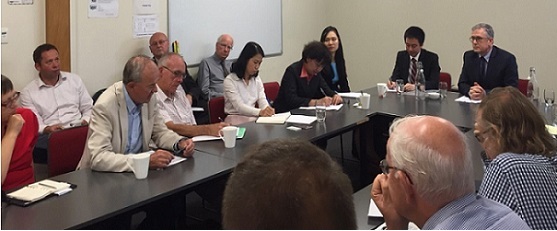
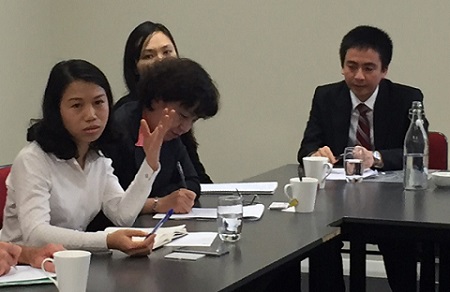
US Air War College roundtable with CSS
7 March 2016
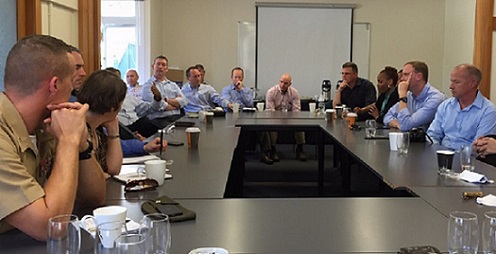
On 7 March, the Centre for Strategic Studies held a Roundtable discussion with a group of visiting professors, officers and students from the US Air War College. The United States Air Force Air War College is the senior US Air Force professional military school. The group visited the Centre to learn about security and other key strategic issues in the Asia-Pacific region from a New Zealand perspective.
CSS co-chairs CSCAP study group on preventive diplomacy
20–22 January 2016
Jim Rolfe, senior fellow with the Centre for Strategic Studies, co-chaired the second meeting of the Council for Security Cooperation (CSCAP) Study Group on Preventive Diplomacy pdf102KB . The Study Group is examining preventive diplomacy case-studies and considering ways of developing training material on preventive diplomacy for use by the ASEAN Regional Forum.
